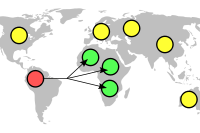Geocast

Geocast refers to the delivery of information to a group of destinations in a network identified by their geographical locations. It is a specialized form of multicast addressing used by some routing protocols for mobile ad hoc networks.
Geographic addressing
|
|
|---|
|
|
|
|
|
|
|
|
|
|
A geographic destination address is expressed in three ways: point, circle (with center point and radius), and polygon (a list of points, e.g., P(1), P(2), …, P(n–1), P(n), P(1)). A geographic router (Geo Router) calculates its service area (geographic area it serves) as the union of the geographic areas covered by the networks attached to it. This service area is approximated by a single closed polygon. Geo Routers exchange service area polygons to build routing tables. The routers are organized in a hierarchy.
Applications
Geographic addressing and routing has many potential applications in geographic messaging, geographic advertising, delivery of geographically restricted services, and presence discovery of a service or mobile network participant in a limited geographic area.[1]
See also
References
- ↑ J.C. Navas, T. Imielinski (1997). GeoCast - Geographic Addressing and Routing. Proceedings of the 3rd annual ACM/IEEE international conference on Mobile computing and networking. Budapest, HU: Association of Computing Machinery. pp. 66–67. CiteSeerX 10.1.1.102.8784
 . ISBN 0-89791-988-2.
. ISBN 0-89791-988-2.
External links
- RFC 2009 GPS-Based Addressing and Routing
- A Survey of Geocast Routing Protocols




